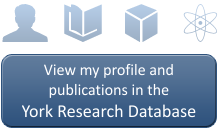Professor James Chong
Head of Department
Research
Anaerobic applied systems biology
Anaerobic microbes were among the first forms of life to inhabit our planet. They continue to occupy a wide range of environments (anywhere oxygen concentrations are low...) and have developed a wide repertoire of unique biochemical pathways.
Methanogenic archaea are an increasingly economically important group of microorganisms. A series of unique biochemical pathways means that these microbes are able to synthesise methane, the flammable component of natural gas, from basic components such as carbon dioxide and hydrogen. On a global scale, methanogens are responsible for the synthesis of approximately a billion tonnes of methane per year. In addition to their potential to contribute to climate change, methanogens are also a key component in the decomposition of organic matter via anaerobic digestion (AD). AD has the potential to produce substantial quantities of renewable energy from waste. This technology is already used to dispose of food waste and recover resources from wastewater sludge. My group is using molecular methods to understand how anaerobic microbial communities, which include methanogens, interact with each other and respond to their environment. In collaboration with industrial partners, we are measuring the dynamics of the microbial consortia involved in anaerobic digestion. We have recently commissioned System-60: 60 automatically-fed 5L AD systems that allow us to perform replicated experiments to investigate and model community changes in process scale AD. In collaboration with the Biorenewables Development Centre at York we have designed and commissioned a suite of 30L AD reactors equipped with analytical facilities to monitor the physico-chemical changes in these systems.

System-60
Our lab also houses comprehensive facilities for the growth and genetic manipulation of methanogens. We are one of a handful of groups world-wide that have developed and used genetic tools to manipulate methanogen (our organism of choice is Methanococcus maripaludis). Using these facilities we are able to isolate, grow and characterise novel methanogens and other anaerobes for use in real-world applications.
Teaching and scholarship
![]()
I encourage students to integrate the material I teach into a broader view so that they understand the principles underlying how biology works.
![]()
I think it is important that students understand the principles that underlie the techniques and technologies used in biological research and appreciate the implications and challenges associated with the collection and interpretation of data. I want to broaden horizons and challenge students to think about how they could tackle and solve problems with the knowledge they have gained. I encourage my classes to think about how they can apply what they learn to the areas of biology that excite them, by explaining how these techniques can be applied to understanding microbial communities.
![]()
My tutorials focus on improving students’ critical thinking and skills such as using Python to interrogate and manipulate large datasets. I use real-world problems to make strong connections between learning and application.
![]()
I offer students projects where they can gain (or hone) their data analysis skills. Students are encouraged to use the Unix command line, write bespoke bash scripts and Python code, and employ bioinformatics software hosted on the York Super Advanced Research Computing Cluster (Viking) to analyse large metagenomics datasets relating to AD projects that have been carried out in our laboratories.

Contact details
https://sites.google.com/a/york.ac.uk/chonglab/

